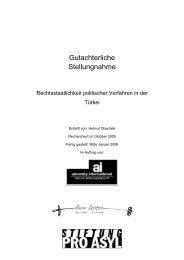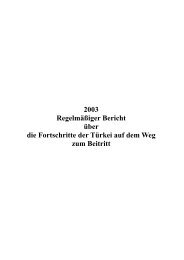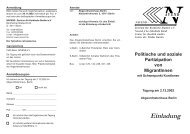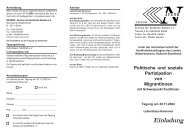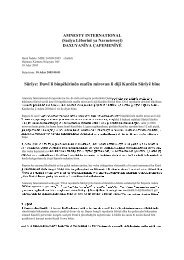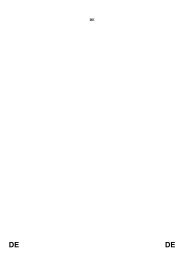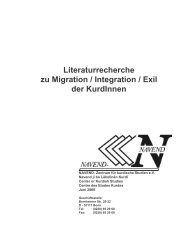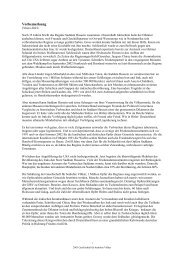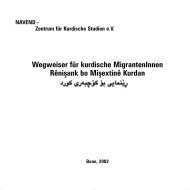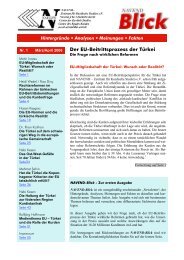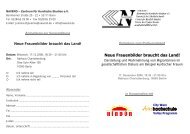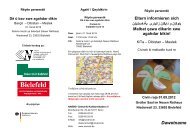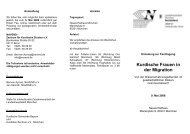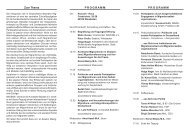Responsibility to protect the Kurds - Navend
Responsibility to protect the Kurds - Navend
Responsibility to protect the Kurds - Navend
You also want an ePaper? Increase the reach of your titles
YUMPU automatically turns print PDFs into web optimized ePapers that Google loves.
<strong>Responsibility</strong> <strong>to</strong> <strong>protect</strong> <strong>the</strong> <strong>Kurds</strong><br />
March 2003<br />
region since <strong>the</strong> end of <strong>the</strong> Gulf war in<br />
1991. How real is <strong>the</strong> potential Turkish<br />
threat?<br />
If one takes <strong>the</strong> Kurdish fear seriously,<br />
<strong>the</strong> worst-case scenario is a Turkish<br />
occupation of Kurdistan without any US<br />
control. In addition <strong>to</strong> <strong>the</strong> estimated 5,000<br />
Turkish soldiers already in Kurdistan,<br />
press information about 60,000 <strong>to</strong> 80,000<br />
Turkish troops planning <strong>to</strong> go deep in<strong>to</strong><br />
Kurdistan could be taken as an<br />
undisputable Turkish intention <strong>to</strong><br />
implement its own agenda. In such a<br />
process, Turkish forces can annex <strong>the</strong> oilrich<br />
cities of Mosul and Kirkuk, provide<br />
weapons <strong>to</strong> Turkomans, disarm Kurdish<br />
forces, undermine Kurdish infrastructure,<br />
and create division and confusion among<br />
Kurdish groups. Such a scenario would<br />
have wide-range consequences. In<br />
addition <strong>to</strong> create a situation that reminds<br />
of <strong>the</strong> Israeli tactics against <strong>the</strong><br />
Palestinians, it also invites o<strong>the</strong>r regional<br />
players, most probabily Iran, <strong>to</strong> be<br />
involved militarily. Such a development<br />
would also have a political and legal<br />
dimension.<br />
While Turkey demands that <strong>the</strong> <strong>Kurds</strong><br />
stick <strong>to</strong> <strong>the</strong> terri<strong>to</strong>rial integrity of Iraq, <strong>the</strong><br />
country itself violates its international<br />
obligations <strong>to</strong> respect and uphold<br />
international law. In <strong>the</strong> vein it also<br />
creates a credible dilemma for <strong>the</strong><br />
American policy, both in Iraq and in <strong>the</strong><br />
Middle East. As <strong>the</strong> Kurdish minister for<br />
reconstruction and development has<br />
expressed it, <strong>the</strong> Americans using <strong>the</strong><br />
Kurdish suffering and <strong>the</strong>ir attempt <strong>to</strong><br />
establish democratic institutions in<br />
justifying <strong>the</strong> war, and at <strong>the</strong> same time<br />
punishing <strong>the</strong> <strong>Kurds</strong> by allowing Turkish<br />
forces <strong>to</strong> enter Kurdistan under <strong>the</strong><br />
pretext of ‘keeping law and order’. ‘So in<br />
one week’, said <strong>the</strong> minister, <strong>the</strong><br />
11<br />
Americans use <strong>the</strong> <strong>Kurds</strong> <strong>to</strong> justify <strong>the</strong><br />
war and <strong>the</strong> possible establishment of a<br />
democratic Iraq, and ‘ano<strong>the</strong>r <strong>the</strong>y want<br />
<strong>to</strong> put us under Turkish occupation.’ 1<br />
Such an event will also create a moral<br />
dilemma. While Turkey insists on a<br />
federal solution for <strong>the</strong> Turks <strong>to</strong> solve <strong>the</strong><br />
Cyprus question, Turkey denies, and<br />
attempts <strong>to</strong> block such a development in<br />
<strong>the</strong> case of <strong>the</strong> <strong>Kurds</strong> in Iraq. This<br />
situation is more of paradoxical because<br />
<strong>the</strong> entire Iraq opposition has already<br />
endorsed a federal solution as a future<br />
form of government in Iraq. Although not<br />
agreeing <strong>to</strong> <strong>the</strong> detailed forms of such as<br />
solution, both president Bush and several<br />
o<strong>the</strong>r senior politicians in his<br />
administration have publicly talked about<br />
a democratic, plural and federal Iraq <strong>the</strong>y<br />
would prefer <strong>to</strong> see.<br />
Although Turkish officials have tried <strong>to</strong><br />
downplay this scenario, past pattern of<br />
Turkish behavior inside Turkey <strong>to</strong> solve<br />
<strong>the</strong> Kurdish problem <strong>the</strong>re is alarming.<br />
This fear is well argued in a report by<br />
Human Rights Watch (HRW), in which<br />
<strong>the</strong> organization proposes several<br />
measures <strong>to</strong> be taken in advance if <strong>the</strong><br />
past pattern of violations were <strong>to</strong> be<br />
prevented in Iraqi Kurdistan. They include<br />
arrangements <strong>to</strong> prevent past patterns of<br />
abuse; avoiding deployment of security<br />
forces with records of abuse; preventing<br />
‘scorched earth’ methods; establishing an<br />
effective moni<strong>to</strong>ring system in advance;<br />
channels and mechanisms established by<br />
NATO governments and o<strong>the</strong>r<br />
governments authorizing supply of<br />
weapons <strong>to</strong> Turkish armed forces <strong>to</strong> fully<br />
disclose <strong>the</strong> circumstances of use of <strong>the</strong>ir<br />
1<br />
Elisabeth Rubin, ‘Two front’, The New Republic,<br />
posted 6 March 2003, at<br />
http://www.tnr.com/doc.mhtml?i=20030317&s=rub<br />
in031703



